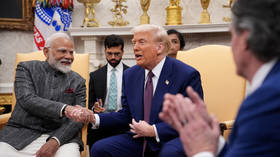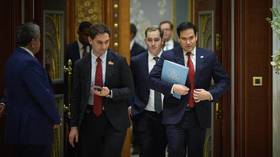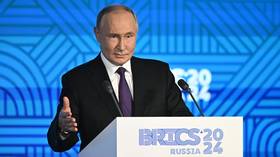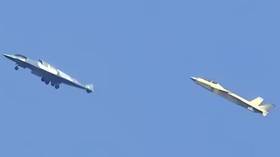Russia has a new game plan for South Asia — RT World News

Moscow views Pakistan as a promising regional partner and plans for cooperation in security and trade are already underway
Russia-Pakistan relations have been in the spotlight in recent months – from the visits of high-level delegations to the signing of various cooperation agreements, trade deals, and even joint counterterrorism exercises. All this means that Russians are becoming increasingly aware of another promising partner in South Asia.
Earlier this month, Russian Ambassador to Pakistan Albert Khorev said in an interview with TASS that the Kremlin shares the country’s concern over growing terrorist activity – something that has been a point of contention between Islamabad and New Delhi, Moscow’s key partner in the region.
Khorev stated that Russia fully supports Islamabad’s determination to combat this threat and emphasized that Moscow acknowledges the rising security challenges facing the country and is committed to enhancing constructive cooperation with both Pakistan and neighboring Afghanistan.
The ambassador highlighted the productive counterterrorism collaboration between Russia and Pakistan, noting the effectiveness of expert consultations at the deputy foreign minister level. These high-level dialogues have played a significant role in strengthening bilateral efforts against terrorism, the envoy emphasized.
The countries are also fast-tracking important economic agreements. For instance, freight railway transportation between Russia and Pakistan is scheduled to commence in March 2025, according to a recent statement from the Russian Ministry of Transport. The announcement was made after the two countries signed an action plan for cooperation in the transportation sector at the 3rd Caspian Economic Forum, held in Tehran. This plan includes establishing a transport link with Pakistan, as the initial stage of the route will pass through Iranian territory.
The route to Pakistan will serve as an extension of the International North-South Transport Corridor (INSTC), which Russia is developing alongside Iran and India as an alternative to traditional trade routes like the Suez Canal.
For foreign policy experts, the deepening ties between Russia and Pakistan come as no surprise. Interest in the evolving relationship between the two countries has grown steadily since 2014, gaining particular momentum after 2022.
Despite this upward trajectory, Russia perceives Pakistan as a nation with a complicated political landscape, persistent socio-economic challenges, and enduring security concerns—issues unlikely to be resolved in the near term. While the potential for bilateral cooperation appears promising, the future of the relationship remains marked by a degree of uncertainty.
The long shadow cast by elections
The February 2024 Pakistani general parliamentary elections, were undoubtedly the country’s most significant political event. Three parties competed in the elections: the Pakistan Muslim League-Nawaz (PML-N), the Pakistan People’s Party (PPP), and Pakistan Tehreek-e-Insaf (PTI). Although the first two parties were not formally allied, they represented the traditional political elite and were apparently favored by Pakistan’s military establishment.
In contrast, supporters of PTI and its leader, former Pakistani Prime Minister Imran Khan, faced administrative restrictions and criminal prosecution. In January, Khan, who remains a popular political figure figure in the country, was sentenced to 14 years in prison for corruption (after already spending 18 months in jail). He maintained that the cases against him are part of a “political witchunt” to keep him out of office. Khan’s wife, Bushra Bibi, was also charged in the corruption case and given a 7-year term. She was arrested in the courtroom after the verdict was given.
Although the opposition managed to secure a relative majority of seats in parliament in last year’s election, this did not alter the final outcome – thanks to coalition negotiations, the allocation of parliamentary seats to women and religious minorities, and independent candidates who ultimately joined PML-N and PPP, the latter parties were able to form a coalition government and secure key positions in both the executive and legislative branches.
Unsurprisingly, the opposition refused to recognize the legitimacy of the new government, citing discrimination during the election campaign, vote counting irregularities, and a general collusion between political and military elites.
READ MORE:
India refuses to be America’s attack dog against China
The confrontation between the government and Khan’s supporters resulted in tragedy by the end of last year. In November, Khan urged his supporters to take to the streets, demanding a review of the election results, the release of detained allies, and the repeal of the 26th amendment of the Constitution of Pakistan, concerning the powers of the Supreme Court. The street protests that erupted then resulted in many casualties among both law enforcement officers and demonstrators.
The situation was exacerbated when the protest leaders—Khan’s wife Bibi and Chief Minister of Khyber Pakhtunkhwa province Ali Amin Gandapur, abandoned their supporters and left Islamabad amidst the chaos. For the opposition, the outcome of this confrontation was rather disheartening – the protests failed to influence the government, while responsibility for the deaths of law enforcement officials and civilians largely fell on the protest leaders who, as many believe, displayed cowardice and were unworthy of their party leader.
The setbacks faced by the opposition, however, do not signify the defeat of Imran Khan, who remains active from behind bars. This week, Khas announced that his PTI party will launch a nationwide protest movement with other opposition parties for “the restoration of democracy” and Pakistan’s constitution after the holy month of Ramadan. Khan’s popularity remains strong as long as the government fails to address the country’s considerable socio-economic challenges.
Gradual recovery
Despite many persisting issues, 2024 proved to be a relatively favorable year for Pakistan’s economy. A decline in budget deficits, public debt, and inflation rates has sparked optimism among observers, since the country avoided default and a major crisis – at least according to key macroeconomic indicators.

This relative stability can largely be attributed to the implementation of an International Monetary Fund (IMF) program and the assistance received from the organization. In July 2024, the IMF announced a new loan of $7 billion for Pakistan, contingent upon continued economic reforms. These reforms include enhancing the efficiency of the tax system and phasing out subsidies in the energy sector.
This situation presents two main challenges. Firstly, the IMF remains Islamabad’s only immediate solution for its economic troubles. This indicates that Pakistan’s macroeconomic model essentially remains unchanged – it is heavily reliant on external capital, as there are no viable conditions for tapping into domestic financial resources.
Secondly, the IMF’s requirements come with their own problems. Broad budget cuts, increased tax burdens, and the liberalization of energy prices will primarily impact ordinary people, who are already facing considerable economic challenges. In this context, it can be assumed that the government will continue to navigate between the IMF’s demands and the expectations of the people. This balancing act will involve implementing half-measures that allow for further borrowing from financial institutions without provoking a fierce backlash from potential voters.
Such a strategy is unlikely to address the country’s structural problems, and will exacerbate the overall socio-economic situation, leading to rising social tensions and threats to national security.
Old problems, new approaches
In 2024, the Pakistani elite expressed significant concern over growing terrorist activity in the provinces of Khyber Pakhtunkhwa and Balochistan. The Pakistani leadership attributes the worsening situation in Khyber Pakhtunkhwa to the Afghan authorities’ reluctance to cooperate with Islamabad in countering Tehreek-e-Taliban Pakistan (TTP). Meanwhile, Balochistan faces additional turmoil as the Balochistan Liberation Army (BLA) targets Chinese workers and engineers involved in China-Pakistan Economic Corridor (CPEC) projects.
To address these threats, in June 2024 the government announced the launch of a “multi-domain counter-terrorism campaign” called “Resolve for Stability” (Azm-e-Istehkam). Since there is little public information about the campaign, it is difficult to assess specific changes, and we can only rely on certain comments from Pakistani elites.

The military leadership emphasizes that this campaign is more than just another counter-terrorism operation; it aims to be a comprehensive initiative focused on the long-term resolution of the terrorism issue. It’s likely that the military will seek to move away from large-scale combat operations that have led to civilian casualties in favor of targeted actions that minimize collateral damage.
In this context, the revival of joint counter-terrorism exercises between the armed forces of Russia and Pakistan look quite promising. This collaboration serves the interests of both Moscow and Islamabad and does not infringe on the security concerns of other countries.
Pakistani experts have pointed out that while there has been progress in the field of security cooperation between Russia and Pakistan, it has not extended to economic collaboration. With an increase in high-level contacts between the two countries last year and in the first months of this year, the imbalance is being addressed, as both sides are actively looking for ways to establish an economic foundation for their partnership. The agreements signed by the two countries in the 9th Session of the Russia-Pakistan Intergovernmental Commission on Trade, Economic, Scientific and Technical Cooperation last year – spanning sectors like energy, industrial development, logistics, trade, and education – provide hope for establishing a solid foundation for bilateral relations.
The central question is whether these governmental agreements will translate into tangible business contracts. Considering the structural challenges both economies face, substituting concrete commitments with mere declarations of goodwill would serve neither side’s interests. If the planned initiatives fail to materialize, the discussions and statements from Russia-Pakistan meetings will amount to little more than empty rhetoric. However, should Moscow and Islamabad succeed in launching mutually beneficial projects, it could elevate their bilateral relationship to a new level.



